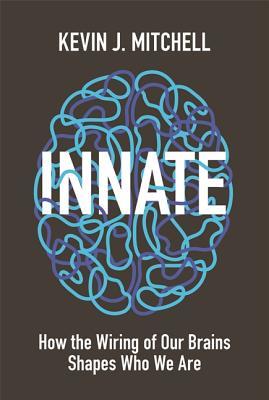intelligence
Every Schoolchild Should Read This Book
If read early enough, Innate might provide some inoculation against bad or naïve information about human nature and the indisputable role played by genes.

A review of Innate: How the Wiring of Our Brains Shapes Who We Are by Kevin J. Mitchell. Princeton University Press (October 16, 2018) 304 pages.

Kevin Mitchell’s Innate: How the Wiring of Our Brains Shapes Who We Are is a book for high school students. And I mean that as a compliment. Profound misunderstandings about the genetic nature of human beings lie at the heart of the social justice movement, as well as some education reforms, attitudes toward mental disorders, aspects of the self-help industry, and social policies including but not limited to immigration, welfare, racism, and sex/gender issues. What a person understands or misunderstands about genetics is a foundation for evaluating new ideas encountered in college, forming political opinions, dealing with difficult co-workers, tackling issues of parenthood and family, and generally living day-to-day life.
If read early enough, Innate might provide some inoculation against bad or naïve information about human nature and the indisputable role played by genes. That is why it belongs on high school reading lists, not just in science classes. Think general liberal education.
Kevin Mitchell is a neurogeneticist who has a knack for explaining things like a good science writer. His book does not break much new ground, but it explains what we know at this time about genetics and human differences with a clarity that presumes no technical background or previous study of genetics. It is a good read for anyone at any age interested in how we get to be who we are, or more accurately why we are different from everyone else. That is, this book is all about human variation. According to Mitchell, the key to individual differences is a combination of a unique genetic recipe for a soup of proteins specified in our DNA (the “innate” of the book’s title) and how that recipe comes to fruition during brain development when the recipe is subject to unique random errors with cascading effects from protein formation to neural circuits.
The role of these random errors of development is typically viewed in heritability estimates as the effects of the “non-shared” environment, but this assumes all environmental effects are extrinsic to the person. Mitchell’s point is an important one—variation in the development of the brain is actually more intrinsic and should be included as part of nature rather than nurture.
As a consequence of the confluence of DNA and brain development, genes alone are only a probabilistic basis for inheriting proclivities that may or may not come into being. As he notes, 100 genetically identical clones will not result in 100 identical individuals, and that’s without bringing in environmental differences. This was unforgettably dramatized in The Boys from Brazil (Levin, 1976) (or watch the riveting movie version; spoiler alert: there are Nazis). Mitchell’s bottom line: DNA shapes but does not determine who we become.
This reasonable, almost mundane conclusion is widely shared by most researchers in the field. More than some other authors/researchers, however, Mitchell de-emphasizes or explains away controversies like how we define sex, group differences in average intelligence test scores, whether we have free will, and some other perceived consequences of genetic influence. In my view, many of these issues and controversies are deeper and more complex than he allows. Nonetheless, Innate is a simple introduction to the complexities of what genetic data mean and what they do not mean. The first section deals with human nature, basic strategies for genetic research, basic neuroscience about brain structure and function and development, environment/experience, and brain plasticity. The second deals specifically with personality traits, individual differences in perception, intelligence, sex differences, and brain disorders. The final chapter discusses the implications of knowing how genes influence brain development and the aforementioned characteristics.

Here are four quotes to illustrate the clarity with which major points are made:
Just showing that a trait is genetic does not mean that there are genes “for that trait.” Behavior arises from the function of the whole brain—with a few exceptions it is very far removed from the molecular functions of specific genes. In fact, many of the genetic variants that influence behavior do so very indirectly, through effects on how the brain develops (7).
Answering the question of how genetic variation leads to differences in traits is ultimately what the modern science of genetics is all about (48).
Many studies have looked for systematic associations between specific environmental factors or experiences that differ between siblings and specific behavioral outcomes… The results from these studies are very clear. They have failed to identify any robust, consistent, or substantial effects on any of a variety of outcomes including adjustment, personality measures, or cognitive ability (53).
All of the processes of neural development… —patterning, proliferation, differentiation, cell migration, axon guidance, synapse formation—rely on differential gene expression and on interactions between proteins (signals and their receptors, to begin with, as well as all the internal pathways of proteins that mediate the reactions to such signals). This means that each of these processes is subject to noise at multiple levels. As a result, none of these processes in the developing embryo is deterministic (69).
In the final chapter, Mitchell presents the main ethical concerns about using genetic knowledge for predicting or changing complex traits. Overall, he warns about potential misuses and he is careful to be neutral on specific questions. Who, for example, disagrees with the concluding summary:
Some of us make our way through the world with ease, and some of us struggle to fit in or get along or keep it together. Denying those differences or constantly telling people they should change is not helpful to anyone. We should recognize the diversity of our human natures, accept it, embrace it, even celebrate it (269).
Although we follow each other on Twitter, I would like to see more details in his book about what Mitchell thinks about difficult issues. Perhaps just explaining why we know what is innate and how we know it is enough to invite productive discussions.
I have some minor issues with citations and with explanations of some brain imaging data (my specialty), but on the whole I don’t disagree with much that Mitchell has written. One general perspective where I do differ is with his view that the genetics of brain development are so intricate, it is unlikely we will ever find a way to manipulate genes to enhance mental abilities like intelligence or correct complex mental disorders like schizophrenia.
I am more optimistic, but mostly because I take a decades-long view and have faith in advanced technologies not yet imagined that surely will evolve from genomic information methods, CRISPR and other gene editing technologies, as well as future insights from neuroscience.
Will this book change any minds already steeped in blank slate assumptions or consumed by social construction theories of all things human? Probably not. But early prevention based on data is an effective strategy. Let us get books like Innate into the hands and minds of students as early as possible so that informed public discussion of ethical, social, and political issues surrounding genetic knowledge keeps pace with the inexorable growth of that knowledge.
* * *
Author note: Just as I was finishing this review, I learned about the mob shaming of a young social scientist who has written about intelligence, group differences, politics, and why discussing data from controversial areas of research is important for dispelling myths. Hundreds of academics signed a letter demanding he be fired from his university fellowship. The letter relied mostly on ad hominin attacks and slogans like “genetic intelligence” rather than specific refutations of empirical studies. Most of the hundreds of academic signers were in fields far outside the peer-reviewed publications at issue. They apparently had no knowledge about the modern status of either intelligence or genetic research findings or what they mean and do not mean. Clearly, high school inoculation with scientific data is too late for them. There are a number of recent books written by scientists that might influence their thinking if they cared enough to read them with an open mind. I hope the university decision-makers that are considering the letter’s demand for firing and its impact on academic freedom will support continuing the fellowship.






